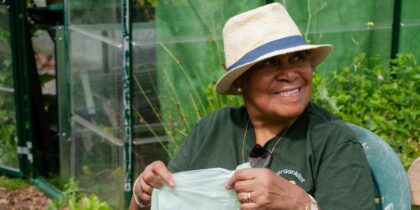By Nuwan Dissanayaka
“He’s not in, mate. I don’t know who you are but you should help him. He was up all night shouting again. He really needs help”. On a balcony ten floors up, buffeted by the biting wind, we’re standing at the door to Jimmy’s flat. There’s no reply and the unutterable graffiti emblazoned on the chipboard covering his smashed kitchen window tells us in no uncertain terms that the world is not welcome here. A benevolent maintenance man had let us into his tower block in as Jimmy didn’t answer his intercom, he rarely does. He was supposed to attend a research workshop yesterday but the taxi driver we’d arranged said there was no sign of him. We’re here to check that he’s ok.
I am, and have always been, a frontline psychiatrist. That’s not to say that I don’t I admire my academic colleagues – I’m in awe of their big analytical brains and I am grateful for the evidence base that they provide the rest of us with. But over the years the realisation has dawned on me that the particular group with severe mental illness whom I support don’t figure much in what they write.
So, in March 2021 I was excited to be asked to be the local principal investigator for an innovative project called Co-PACT. Its ambitious aim was to draw upon the lived experience of those who had been detained to co-produce novel approaches to reduce the use of the Mental Health Act, particularly for those from racialised communities. In our Assertive Outreach team I see a group who, without exception, have been detained many times and unsurprisingly, many are from racialised communities. Finally, I thought to myself, here is an opportunity to get involved in some research which might positively influence future policy…
awareness of severe mental illness remains poor… some face a struggle, day after day, with severely disabling symptoms and some are never far away from the next significant relapse
It was exhilarating spreading the word about this project to potential recruits and it felt so promising that at last their voices would be heard. The project involved a series of paid workshops and several people were keen to sign up to share their (mostly negative) experiences of detention under the Mental Health Act. But as the weeks passed by and the date for the first workshop approached my new-found evangelism began to evaporate.
Whilst it is positive that mental health is no longer as taboo a subject as it once was, my impression is that the awareness of severe mental illness remains poor and the narrative presented is often one of conditions which are episodic in nature. That might be true for some, but others face a struggle, day after day, with severely disabling symptoms and some are never far away from the next significant relapse. Sadly, this was true for several people I had hoped might take part in the project.
As they became unwell, some lost the capacity to consent to participation in the study and others refused, their change of heart fuelled at times by resurgent paranoia or an increasingly unbridled mania with the chaos and hostility that sometimes accompany it. They became too ill to tolerate the workshops or too risky as a consequence of their deteriorating mental state to be around the others taking part. And for some, their hospital admissions were followed, as is often the case, by a dark period during which they were left feeling lost and lonely, once more defeated and trying to make sense of what had just happened to them. Although lifesaving at times, being admitted to hospital can be traumatic and the last thing they needed now was to re-live the trauma of their treatment.
There is meaning in their psychosis if we care to look for it, and who better than these people to open our eyes to the inconvenient truths of racial inequity and disproportionate detention by mental health services?
But their journeys are rich with a narrative that really needs to be heard. Could we not learn lessons from the African asylum seeker who fled his war-torn homeland and is now tormented by flashbacks which he struggles to explain in a language that isn’t his mother tongue? He lives hand to mouth on a paltry government allowance as he tries his best to navigate this new hostile environment with no guarantee that he will even sleep in the same bed tonight. Or how about the self-anointed Indian prince whose grandiosity and suspicions about services are so obviously rooted in the unpalatable legacy of empire and a repeated exposure to institutional racism? There is meaning in their psychosis if we care to look for it, and who better than these people to open our eyes to the inconvenient truths of racial inequity and disproportionate detention by mental health services?
I take for granted the efforts we make in our Assertive Outreach Team staff as we endeavour to engage with people like Jimmy whose lives are chaotic or who have poor motivation as a consequence of their illness (or occasionally its treatment). It’s second nature for us to work flexibly and creatively, determined to stay in touch with the homeless, digitally excluded and people for whom night replaces day due to interminable insomnia, making it near impossible to keep vital appointments. Even in the absence of prohibitive relapse and risks, all of these factors pose practical barriers to the involvement of people in all activities (including research) which might help shape mental health services to better meet their needs.
Maybe it is time for… us to challenge our apathy towards this marginalisation
Our broader efforts were rewarded with a good turnout at the Co-PACT workshops in Leeds but I was somewhat sad that not a single person from my caseload made it there in the end. Their contribution was as minimal as it had been to the Independent Review of the Mental Health Act. I have no doubt that those who were able to contribute to the review of Mental Health Act detention will have a positive impact on this work, but I am left wondering how the lived experience of these others can be harnessed.
Maybe it is time for a rebalancing of our conversation about mental illness and for us to challenge our apathy towards this marginalisation. And maybe it is time that I, as a frontline clinician, made a commitment to engage with my new researcher friends, about what we can collectively do to better include those whose voices are never heard because, to quote the late Desmond Tutu, “Exclusion is never the way forward on our shared paths to freedom and justice”.
Jimmy is a pseudonym for an amalgam of people Nuwan sees.
This project is funded by the National Institute for Health Research (NIHR) Policy Research Programme. The views expressed are those of the author and not necessarily those of the NIHR or the Department of Health and Social Care.








